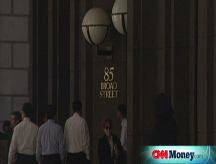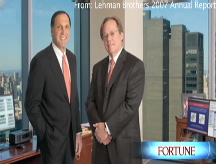Even Goldman guys worry
Rocky credit markets prompted the firm to trim its balance sheet even though it was in much better shape than its peers.
NEW YORK (Fortune) -- How stormy are the credit markets? Why, even Goldman Sachs is trimming its sails.
The New York-based investment bank posted stronger-than-expected second-quarter earnings Tuesday, as solid gains in equity underwriting and asset management offset slowdowns in fixed-income-related businesses.
Goldman (GS, Fortune 500) posted yet another billion-dollar-plus quarterly profit-a streak that looks all the more impressive in the light of massive losses taken over the past year at rivals Merrill Lynch (MER, Fortune 500), Morgan Stanley (MS, Fortune 500) and Lehman Brothers (LEH, Fortune 500).
But for all its savvy in playing mortgage-related unrest to its advantage, Goldman showed Tuesday that even it is wrestling with the risks of using borrowed money to make big bets in an uncertain market. Just a quarter after saying Goldman didn't need to reduce the size of its balance sheet, finance chief David Viniar told analysts and investors Tuesday that Goldman spent the last quarter doing just that.
"We know there is some risk to being bigger," Viniar said on a Monday morning conference call after the release of the firm's numbers. He said Goldman is "sensitive" to the views of shareholders, regulators and ratings agencies who have increased their scrutiny of leverage ratios following March's collapse of Bear Stearns, and "we want to do the smart thing."
That's why, Viniar said, Goldman reduced the assets on its balance sheet to just under $1.1 trillion at May 30, from just under $1.2 trillion at the end of the first quarter in February.
Though Viniar stressed that "we don't think leverage ratios are a particularly good measure of risk," he said the sale of assets across Goldman's balance sheet brought its gross leverage ratio, reflecting the amount of assets Goldman holds compared with its shareholder equity, to 24.3 from 27.9 at the end of the first quarter. On an adjusted basis, Viniar said, the ratio dropped to 14.7 from 18.6.
Goldman's push to delever marks a shift from its stance back in March. "We have no need as we sit here right now to shrink our business," Viniar said in response to a question asked on the company's first-quarter conference call back on March 18.
Goldman's quiet move come at a time when its smaller rival Lehman Brothers has been loudly advertising its own balance-sheet diet. Lehman spent the second quarter selling assets in a bid to persuade investors that it is financially strong enough to ride out the credit crunch that started last summer with the collapse of the mortgage markets.
The very public deleveraging push at Lehman seems to have failed to win the day, given last week's demotion of finance chief Erin Callan. Lehman chief Dick Fuld told investors Monday that Lehman was mostly done with its deleveraging, though he stressed that the firm would look for opportunities to change the mix of its real estate holdings.
Meanwhile, Goldman's caution isn't limited to the firm's balance sheet. Viniar said on Tuesday's call that with Goldman and the rest of the financial sector having spent recent months deleveraging, there is "a lot of cash sitting on the sidelines" that should be put to work when the investment outlook starts to look brighter.
But that han't happened yet. "It's not like we saw tremendous opportunity to buy," Viniar said in response to one question about purchases of nonperforming loans.
"What we will do with our exposures and our risk will depend on the opportunities we see in the market," Viniar said. "We're very fluid with that, as you know." ![]()
-
 The retail giant tops the Fortune 500 for the second year in a row. Who else made the list? More
The retail giant tops the Fortune 500 for the second year in a row. Who else made the list? More -
 This group of companies is all about social networking to connect with their customers. More
This group of companies is all about social networking to connect with their customers. More -
 The fight over the cholesterol medication is keeping a generic version from hitting the market. More
The fight over the cholesterol medication is keeping a generic version from hitting the market. More -
 Bin Laden may be dead, but the terrorist group he led doesn't need his money. More
Bin Laden may be dead, but the terrorist group he led doesn't need his money. More -
 U.S. real estate might be a mess, but in other parts of the world, home prices are jumping. More
U.S. real estate might be a mess, but in other parts of the world, home prices are jumping. More -
 Libya's output is a fraction of global production, but it's crucial to the nation's economy. More
Libya's output is a fraction of global production, but it's crucial to the nation's economy. More -
 Once rates start to rise, things could get ugly fast for our neighbors to the north. More
Once rates start to rise, things could get ugly fast for our neighbors to the north. More









